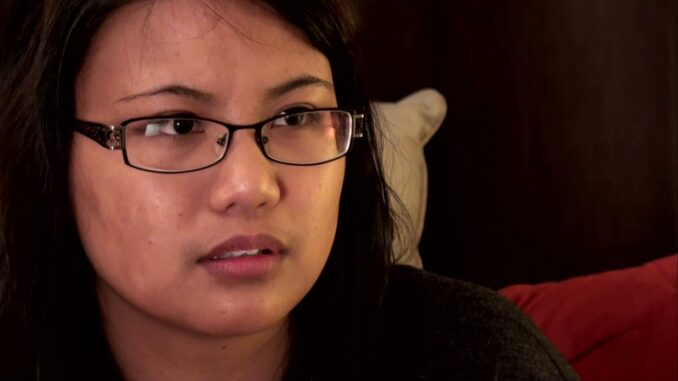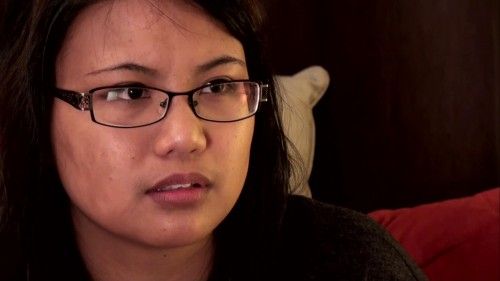

Bernie Burke put her audience at ease right from the start last Thursday night. “There are no rubbish films here,” she said. Lit by the aisle lamps of the Dendy Newtown, the curator and producer of the Sydney Fringe Film Festival wanted the audience to feel welcome and know they were going to enjoy themselves. Perhaps Bernie’s statement channelled a little known but apt remark from Beavis & Butthead: “I don’t like videos that suck.” There was no need to worry.
The Sydney Fringe Film Festival is held over three Thursday nights from September 13. This review is of ‘International night’, on September 20.
The independent films by Australian filmmakers challenged, entertained and at times perplexed but did not disappoint. The program opened with Work / Flow, a short film by poet, performer and artist Elena Knox. Work / Flow challenged the audience with the idea that a poet’s work moves from creation directly to shredding. Whether this is a physical shredding of paper or a metaphorical one is for the viewer to decide.
T.M.I (Too Much Information) by Jason Ide was a challenge of a different sort. Anyone who has ever lived in a share house will recognise the slightly awkward rituals in the communal lounge room that normally accompany a couple about to break away to have sex. Hopefully after shutting the door first, though many will recall moments when one couple or another neglected this sensible modesty shield. This film is worth seeing just for the deadpan delivery of the line, “Like a banshee, they said. Like a filthy, depraved sex banshee.”
Lovers of a different sort, of colour and movement, will enjoy Kerplonk, directed by Serena Hunt. There is a deliberate cartoon feel to this film about a scientist who finds himself at the centre of a sequentially collapsing laboratory. Big power switches, test tubes and bubbling beakers abound, all of it beautifully shot to bring out gorgeous colours and reflections. Aficionados of cartoons, or the classic game with a similar sounding name, will be unable to resist publicly pointing and laughing.
The Katrina Channells documentary Chasing Chavez was one of two longer films, at about one hour, shown on the night. Chasing Chavez seems to exist on two levels. On the surface, it is the story of Coral Wynter and her husband Jim McIlroy travelling across Venezuela in order to present President Hugo Chavez with a copy of their book Voices from Venezuela. On another level, the film is a celebration of the cult of the personality of Chavez and an affirmation of the ‘Bolivarian Revolution’.
There is a lot of material in Chasing Chavez, and the film suffers slightly for it. The momentum of the narrative stalls about half way through, as the burden of explaining the socialist revolution and criticising opponents such as the USA becomes too much. Coral and Jim recover the momentum with an enthralling last minute quest to finally meet Chavez on the set of his television show. The twists and turns of this frantic journey were some of the best entertainment on screen this year. A funky soundtrack and fascinating scenes of life on the streets, including a 1970s Australian Ford Falcon, helped make this an out of the ordinary documentary.
After an interval in the nicely redecorated Dendy lounge, festivallers were treated to two short films from Warlayirti Artists Aboriginal Corporation. Secure your load reveals a unique way of reuniting a lost spare wheel with a Land Cruiser, while Motika Graveyardsuggests a new way of reanimating a completely wrecked vehicle. These short films are both charming and clever. In the best traditions of show business, they made the audience laugh and left them wanting more.
A new issue for many in Australia is that of sustainable food production and distribution. Growing Change by Simon Cunich explores the related issues of food security and organic farming, using Venezuela as a case study. The issues are complex and there is only an hour to explore them, but Cunich keeps things moving along. Partly, this is achieved with graphics that illustrate the elements of his argument. It sounded a little like a training film but it worked well. There were also some fascinating insights into gardening on freeway embankments and other unusual places. By the end, at the very least the audience members would be thinking about putting in a vegetable patch and some chickens. At their local roundabout, perhaps.
Taken as a whole, the program offered an entertaining evening. The range of topics and techniques on show offered something more than a program with one feature film. There is also the enjoyment of wandering through the varied collection of shops, bars and community spaces in Newtown before sitting down in a comfortable cinema seat to see several films that include material not normally aired in the mainstream.
Based on the fun factor and intellectual stimulation of International night, Queer Night on September 27 is a must see.

Leave a Reply